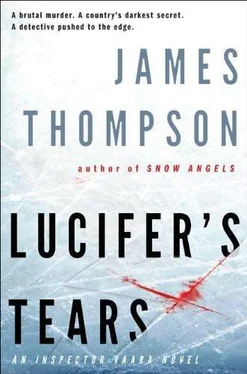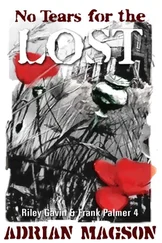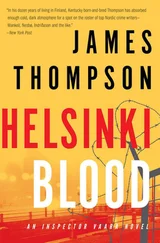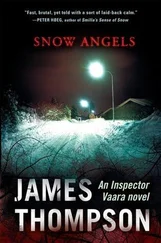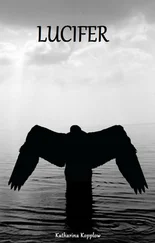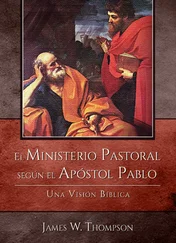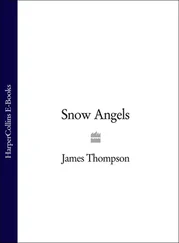James Thompson - Lucifer's tears
Здесь есть возможность читать онлайн «James Thompson - Lucifer's tears» — ознакомительный отрывок электронной книги совершенно бесплатно, а после прочтения отрывка купить полную версию. В некоторых случаях можно слушать аудио, скачать через торрент в формате fb2 и присутствует краткое содержание. Жанр: Полицейский детектив, на английском языке. Описание произведения, (предисловие) а так же отзывы посетителей доступны на портале библиотеки ЛибКат.
- Название:Lucifer's tears
- Автор:
- Жанр:
- Год:неизвестен
- ISBN:нет данных
- Рейтинг книги:5 / 5. Голосов: 1
-
Избранное:Добавить в избранное
- Отзывы:
-
Ваша оценка:
- 100
- 1
- 2
- 3
- 4
- 5
Lucifer's tears: краткое содержание, описание и аннотация
Предлагаем к чтению аннотацию, описание, краткое содержание или предисловие (зависит от того, что написал сам автор книги «Lucifer's tears»). Если вы не нашли необходимую информацию о книге — напишите в комментариях, мы постараемся отыскать её.
Lucifer's tears — читать онлайн ознакомительный отрывок
Ниже представлен текст книги, разбитый по страницам. Система сохранения места последней прочитанной страницы, позволяет с удобством читать онлайн бесплатно книгу «Lucifer's tears», без необходимости каждый раз заново искать на чём Вы остановились. Поставьте закладку, и сможете в любой момент перейти на страницу, на которой закончили чтение.
Интервал:
Закладка:
John’s knowledge surprises me. It speaks to me that, historian or not, he spent the time to acquire it.
I take up the story. “We declared independence in 1917, but had a civil war the following year-Bolshevik Reds backed by Socialist Russia versus anti-Socialist Whites, as they were called, backed by Imperialist Germany. Like your own American Civil War, it was sometimes brother against brother. The Whites won, but the result was tens of thousands dead, poverty and starvation.”
“You sound passionate about it,” John says.
“You would be surprised, even after nearly a century, what strong emotions the Civil War still dredges up in us.”
“What was the Winter War?” Mary asks.
“Kari,” John asks, “would you allow me to pontificate?”
“Be my guest.”
“During the Second World War, Finland fought three separate wars,” he says. “In the Winter War, Finland fought alone and it kicked Russian ass, but in fact lost, because it ceded territory in the peace agreement. The Soviets invaded Finland on November 30, 1939. The Soviets had thousands of tanks, Finland had thirty-two. The USSR attacked with upwards of a million men. Finns slaughtered them, killed five Russians for every Finn and beat them back. Finland signed a peace treaty with the USSR in March, but was at war with them again in 1941.”
“I’m impressed,” I say.
He continues. “Finland sided with Germany against the Soviet Union in what is known as the Continuation War. The Finnish hope was that the German invasion of Russia would allow Finland to regain lost areas and to annex some Soviet territory in the realignment after the Germans beat them. When it became clear that Germany would lose, Finland signed another armistice with Moscow. Finland ceded more territory and agreed to drive German troops out of their country. The consequence was the Lapland War.” He asks, “Kari, have I gotten it right?”
I finish my kossu and chase it with beer. “In every detail. The German scorched-earth policy as they withdrew resulted in the burning down of Kittila, my hometown, among many others. Again we starved, did without even the most basic necessities. If you can imagine, in this snowy country, citizens wore shoes made out of paper. After the end of the Second World War, even though they had invaded us, among other humiliations, we were forced to pay war reparations to Russia. On a visceral level, we’re still pissed off about it.”
I didn’t realize the people at the table across from us were listening to us. A woman recites a common Finnish sentiment. “Ryssa on aina ryssa, vaikka voissa paistaisi.” A Russian is always a Russian, even if you fry him in butter.
Kate looks at her watch. “We should leave for the restaurant soon.”
I nod agreement. I’m certain that she’s thrilled to see her brother and sister, but John is drunk, and Mary seems a touch strange and dour. The family dynamic and vibe are weird. I’m sure Kate is hoping a change in venue will improve them. I signal Mike for the check and ask him to order a taxi for us.
11
Our taxi stops in front of kamp, alongside an XJ12 Jaguar and a McLaren F1. When the hotel opened in 1887, it was palatial. Over the years, it suffered structural damage, more from wars than anything else, and finally the ballroom dance floor started caving in. In 1966, the original facade had to be torn down and rebuilt. In deference to the part the hotel played-and continues to play-in our cultural heritage, great efforts were made to conserve as much as possible of the original architecture, and it retains its Old World splendor. During the prewar years, our great composer Jean Sibelius threw parties here that sometimes raged for days. In recent years, among other notables, Vladimir Putin and Jacques Chirac have been guests.
We exit the taxi. On the sidewalk, in front of the grayish-green marble entrance, the frigid wind is strong and drives snow into our faces. The doorman wears a traditional top hat and red jacket. He offers a slight bow and deferential greeting, in keeping with Kate’s status as general manager.
“Good evening, Sami,” she says. The hotel has a huge staff, but Kate has learned each and every one of their names. I’m terrible with names and can’t imagine how she did it.
Inside, we pass down a long run of carpet, through a second set of doors and into a large lobby. Its rotunda, supported by massive marble pillars, is dominated by a magnificent chandelier. John turns in a circle. “Damn, Kate,” he says. “Quite a place you’re running here.”
The hotel screams wealth. The mosaic floors-also marble-art and elegant furnishings seem more to John’s taste than our local bar. “Thank you,” Kate says. “I’m proud of it.”
The receptionists, concierge and bellhops also offer Kate smiles and quiet greetings. Again, she calls them all by name, a distinctly un-Finnish habit, and asks how their evenings are going. It’s evident that they like her, and equally so that she’s comfortable here. This pleases me to no end. The hotel is international and the staff speaks fluent English. At least when she’s at work, the cultural isolation Kate suffered living in Kittila, in large part caused by the language barrier, is gone. Kate is in her element.
We stroll through a lounge, past the bar-which is dark wood and brass, much like the one in dreary Hilpea Hauki, which John fails to note-into the dining room, and a gracious maitre d’ seats us. On the other side of the room sit Ivan Filippov, the audacious prick, and his so-called assistant, Bettie Page Linda. Maybe I should be surprised, but I’m not. He catches my eye and nods acknowledgment.
A waiter in a white jacket comes to take our drink orders. “We’re celebrating something special,” Kate says. “A bottle of Tattinger please.”
“And one of those Finnish vodkas for me,” John says.
“He’d like a Koskenkorva,” I say.
The waiter leaves a wine list on the table. John asks where the restroom is and excuses himself. He weaves a bit as he walks away. When he comes back, he weaves no longer. His eyes are sharp and darting. He’s had a little pick-me-up in the men’s room. I wonder if Kate notices.
The waiter arrives with the champagne and pours. Mary places a hand over her glass.
“I didn’t know until today that you’re a teetotaler,” Kate says.
“My husband and I are religious people. Alcohol doesn’t fit in with our beliefs. And after you saw what it did to our father, I’m surprised you touch it either. Especially in your condition.”
Kate reddens. “Mary, I don’t intend to drink the whole glass. I just thought a toast to celebrate us being together, for the first time in more than five years, would be nice.”
Mary checks the wine list. “The bottle cost a hundred and five euros. Can you afford it?”
“I think my family is worth it on this special occasion. And besides, as general manager, I’m expected to eat and drink here occasionally, so that I know our guests are enjoying their dining experiences. The hotel will pay for it.”
Mary concedes defeat, allows Kate to pour a glass for her. Kate raises her champagne flute and we follow suit. “To our family,” Kate says.
We clink glasses and drink to the family. John gulps. Kate sips. Mary allows the champagne to brush her lips, but no more. The waiter brings menus and John’s kossu. I glance at Filippov. He and Linda hold hands and exchange intimate looks.
“John, how do you like being a teacher?” Kate asks.
His pick-me-up has animated him. He gestures with his hands while he talks. “I love academia,” he says. “I specialize in Renaissance history. Teaching about the sins of the Borgias is a bit of a guilty pleasure, like watching pornography.”
Читать дальшеИнтервал:
Закладка:
Похожие книги на «Lucifer's tears»
Представляем Вашему вниманию похожие книги на «Lucifer's tears» списком для выбора. Мы отобрали схожую по названию и смыслу литературу в надежде предоставить читателям больше вариантов отыскать новые, интересные, ещё непрочитанные произведения.
Обсуждение, отзывы о книге «Lucifer's tears» и просто собственные мнения читателей. Оставьте ваши комментарии, напишите, что Вы думаете о произведении, его смысле или главных героях. Укажите что конкретно понравилось, а что нет, и почему Вы так считаете.
